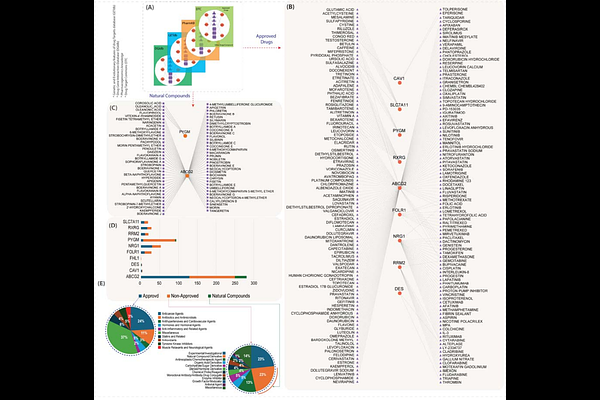A Systems Biology Approach to Unveil Shared Therapeutic Targets and Pathological Pathways Across Major Human Cancers

A Systems Biology Approach to Unveil Shared Therapeutic Targets and Pathological Pathways Across Major Human Cancers
ALAM, A.; Siddiqui, M. F.; Hamoudi, R. A.; Kishore, U.; Fernandez Cabezudo, M.; Al Ramadi, B.
AbstractCancer is a leading global cause of mortality, responsible for nearly 10 million deaths annually, with breast, lung, colorectal, and prostate cancers among the most prevalent. Despite extensive research on individual cancer types, identifying shared molecular signatures could unlock pan-cancer diagnostic tools and therapeutic targets. This study leveraged RNA-seq data from The Cancer Genome Atlas (TCGA) to analyze our selected cancer types (SCTs), breast, lung, colorectal, and prostate, employing a multi-step bioinformatics pipeline. Differentially expressed genes (DEGs) between tumors and normal tissues were identified and validated using an Elastic Net regression model. Weighted Gene Co-expression Network Analysis (WGCNA) revealed highly correlated gene modules linked to clinical traits, pinpointing 179 shared signature genes across the SCTs. Protein-protein interaction (PPI) network and clustering analyses further refined these to 26 hub genes, enriched in cancer hallmark pathways. Nine hub genes KIF18B, RRM2, MYBL2, IQGAP3, TPX2, SLC7A11, RHPN1, HJURP, and SKA3 are stood out due to consistent upregulation in metastatic tumors (breast, colorectal, prostate) and their high expression across more than 18 different cancer types, suggesting roles as oncogenes, prognostic markers, or therapeutic targets. The expression patterns of hub genes were further validated across larger cancer patient cohorts of SCTs, confirming relevance across multiple datasets, and their prognostic significance was assessed by their influence on overall survival (OS). Notably, these hub genes also correlated with immune-related functions, potentially influencing tumor microenvironment modulation. This integrative approach provides a strong framework for identifying cross-cancer potential biomarkers, advancing pan-cancer insights, and supporting improved diagnosis, prognosis, and therapy development.